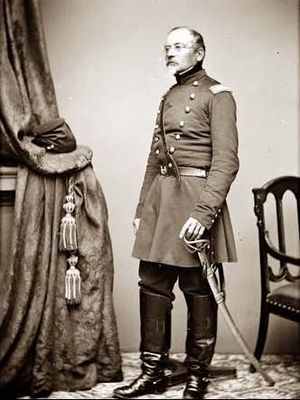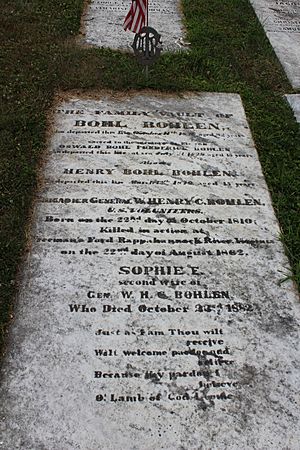Henry Bohlen facts for kids
Quick facts for kids
Henry Bohlen
|
|
|---|---|

Brig. Gen. Henry Bohlen
|
|
| Born | October 22, 1810 Bremen, Germany |
| Died | August 22, 1862 (aged 51) Rappahannock River, Virginia, during the initial stages of the Northern Virginia Campaign |
| Place of burial | |
| Allegiance | United States of America Second French Empire |
| Service/ |
United States Army French Army Union Army |
| Years of service | 1846 - 1848; 1861 - 1862 (USA) 1853 - 1856 (France) |
| Rank | Brigadier General |
| Battles/wars | Mexican-American War Crimean War American Civil War |
Henry Bohlen (born October 22, 1810 – died August 22, 1862) was a brave German-American soldier. He became a Brigadier General for the Union side during the American Civil War. He was actually the first general in the Civil War who was born outside the United States! Before that, he also fought in the Mexican–American War for the U.S. and the Crimean War for France.
Contents
Early Life and Career
Henry Bohlen was born in Bremen, Germany, on October 22, 1810. His parents were traveling in Europe at the time. His father, Bohl Bohlen Luehrs, was German-born but had become a U.S. citizen. He lived in Philadelphia. Henry's mother, Johanna Magdalene Oswald Hahn, was a German-American from New York.
When Henry was very young, his father sent him to a military academy in Delft, Netherlands. However, he had to return to the U.S. in 1832 before finishing his studies. He never went back to Germany to complete them. After moving to the United States, Bohlen became a successful businessman. He sold foreign wines and liquor and became quite wealthy.
Fighting in the Mexican-American War
When the war with Mexico started, Henry Bohlen volunteered to help. He joined the staff of his friend, General Worth, as a special assistant. During this war, he took part in all the battles under Major-General Winfield Scott. After the war ended, he left the army and went back to his business in Philadelphia.
Serving in the Crimean War
Later, Henry Bohlen traveled to Europe because his son needed to improve his health. While there, the Crimean War began. He decided to join the French army and served on their staff. He was involved in the long siege of Sevastopol, including the final attacks and the city's surrender. After the war, he lived in the Netherlands. He stayed there until he heard the news about the attack on Fort Sumter, which started the American Civil War.
American Civil War Service

In 1861, Henry Bohlen was given permission to gather a group of soldiers in Philadelphia. Most of these soldiers were German immigrants. He was very important in forming the 75th Pennsylvania Volunteer Infantry regiment. On September 30, 1861, he became the Colonel and leader of this regiment. His unit served in the division led by Louis Blenker.
In February 1862, a report on the health of the army showed that Bohlen's group was doing well. Only about 5% of his soldiers were sick, which was similar to other groups in Blenker's division. Bohlen's brigade had about 2,250 soldiers in total.
Becoming a General
Henry Bohlen was promoted to Brigadier General on April 28, 1862. He then led the 3rd Brigade in Carl Schurz's Division. This division fought against Stonewall Jackson in the Valley Campaign during the spring of 1862.
His brigade took part in the Battle of Cross Keys on June 8, 1862. However, they did not fight in the Battle of Cedar Mountain on August 9, 1862. This was because their division was camped further away at the time.
Battle of Cross Keys
At the Battle of Cross Keys, Bohlen's soldiers supported another brigade led by Julius Stahel. Bohlen placed his troops behind Stahel's, near the Port Republic Road. His brigade included the 54th New York, 58th New York, 74th Pennsylvania, and 75th Pennsylvania Infantry Regiments. He also had an artillery unit, Battery I of the 1st New York Light Artillery.
Bohlen had positioned his artillery in front of his soldiers. But another officer tried to move the artillery without Bohlen's permission. Bohlen moved it back. When the officer tried to move it again, Bohlen ordered it to stay, but the artillery still moved away.
Death in Battle
On August 21, Confederate General Robert E. Lee marched his army north along the Rappahannock River. He wanted to cross the river beyond the Union army's right side. Union General John Pope knew this might happen and protected the river crossings.
On the afternoon of August 22, General Franz Sigel, Bohlen's commander, sent Bohlen's soldiers across the river. Their job was to check the area west of Freeman's Ford. Once across, Bohlen's men formed a line to scout ahead. They soon met Confederate soldiers led by General Isaac Trimble, who were hidden in thick woods. Trimble's men attacked.
Bohlen sent all his soldiers into the fight, but the enemy was too strong. Bohlen ordered his men to pull back, and they quickly retreated across the Rappahannock River. One of Bohlen's soldiers later said they retreated "so fast that we came near forgetting to stop."
General Robert E. Lee described the fight as "a short but spirited engagement," where Bohlen's brigade suffered "heavy loss." General John Pope also mentioned Bohlen's death in his report, saying, "Our losses during the last three days have been quite heavy, among the killed being Brigadier-General Bohlen."
It is believed that Bohlen was shot through the heart while trying to encourage his troops. He fell dead from his horse into the river. Although he likely died instantly, one soldier claimed to hear the general call out, "Boys, I am dead, but go and fight!" There were rumors that one of his own men killed Bohlen, but most evidence suggests he was well-liked by his soldiers and was killed by a Confederate sharpshooter.
Confederate soldiers held Bohlen's body until it could be returned to his unit. On September 10, 1862, a special agreement was made. An officer from Bohlen's staff retrieved his remains. Henry Bohlen was buried in Laurel Hill Cemetery in Philadelphia.
Family Life
Henry Bohlen married Emily Mary Borie, who was from Philadelphia. They had two daughters:
- Sophie (1837–1915), who married Gustav von Bohlen und Halbach.
- Anita Agnes Clementine (1841–1929), who married Willem Gerard Brantsen Baron van de Zijp.
Henry Bohlen's family tree includes his grandson, the German industrialist Gustav Krupp von Bohlen und Halbach, who was Sophie's son. His great-great-nephew, Charles Bohlen, was a well-known United States diplomat and expert on the Soviet Union from 1929 to 1969.
See also
- List of American Civil War generals (Union)
- Charles Saalmann an infantry officer who initially served under Henry Bohlen during Bohlen's command of the 75th Pennsylvania Regiment of Volunteer infantry.

